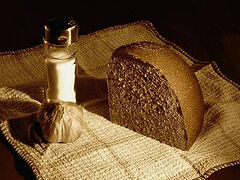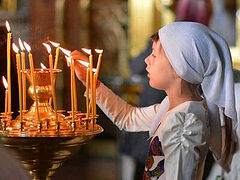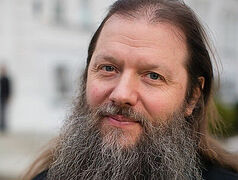Each of us was once an innocent Adam or Eve. We were radiant, smiling, good-natured, gentle and trusting. It was in our childhood. But little by little sin distorted, corrupted and damaged us. We robbed ourselves...
And fasting is the time to return to the childhood state of Paradise. Except ye be converted, and become as little children, ye shall not enter into the Kingdom of Heaven (Mt. 18:3), Christ says. And perhaps that is why shortly before Great Lent the parable on the repentance of the prodigal son is read.
Fasting is a type of service of God, where the main goal is not to kill the flesh, but to subdue the insatiable body to the soul, rising it up and bringing it closer to Christ. As is said in the prayers of Baptism: “That he (she) may be no more a child of the body, but a child of Thy Kingdom”, “that his (her) body may serve the rational soul.”
Fasting is an arena of struggle. The same arena that is often heard about at services. In the spiritual ring the main Spectator and Judge is Christ, and there is only one player—man himself. And he fights not only with the devil—he fights even more with himself.
Fasting is a weapon against our passions, but how often it shoots at our neighbors and becomes a scourge for those around us when a Christian loses his strength and health from excessive abstinence, becoming angry and grumbling!
Fasting is a test of our faithfulness and love for God. The following parable comes to mind: Or what king, going to make war against another king, sitteth not down first, and consulteth whether he be able with ten thousand to meet him that cometh against him with twenty thousand? (Lk. 14:31). And the following words: And whosoever doth not bear his cross, and come after Me, cannot be My disciple (Lk. 14:27).
Fasting is a gift to the Savior, our tithe to Him for the year. But you can’t decorate it with a wrapper of vanity and ribbons of pride. As any real gift, fasting should be presented with all your heart, not regretting the money and time spent.
Great Lent is a time for reflection and Divine contemplation. We sympathize with the suffering Christ and prepare to meet His Resurrection. If you remove the Cross and Pascha from fasting, such abstinence will be no different from the practices of Buddhism or Taoism. Even Lao-tzu some 500 years before the Birth of Christ said that a person must learn to control his desires.
Fasting brings flowers to the soul! The soul can bloom like a spiritual bud if it is watered with living water—the Scriptures, and made fertile with the holy sacraments and prayer. But an ordinary plant fades with the onset of autumn, while a soul that has the Holy Spirit blooms forever.
Fasting is the renovation of the house of the soul. When someone begins to move old sofas and wardrobes, he suddenly discovers a lot of dust and other dirt. The Designer here is God; wallpaper, flooring and ceiling are His commandments; and the worker is man himself. After all, you must someday become what the greatest Artist and Creator intended you to be.
Who among us does not wash his jacket after being doused by a car? Or will he not clean his boots after stepping into the dung? Great Lent is the same washing machine, hard brush, spring cleaning and dry cleaning for the “clothes” of our soul. And each heart must choose a suitable remedy: a spiritual bleach, powder, or conditioner... And there is a remedy, and a universal one. Or rather He. His name is Jesus Christ.





